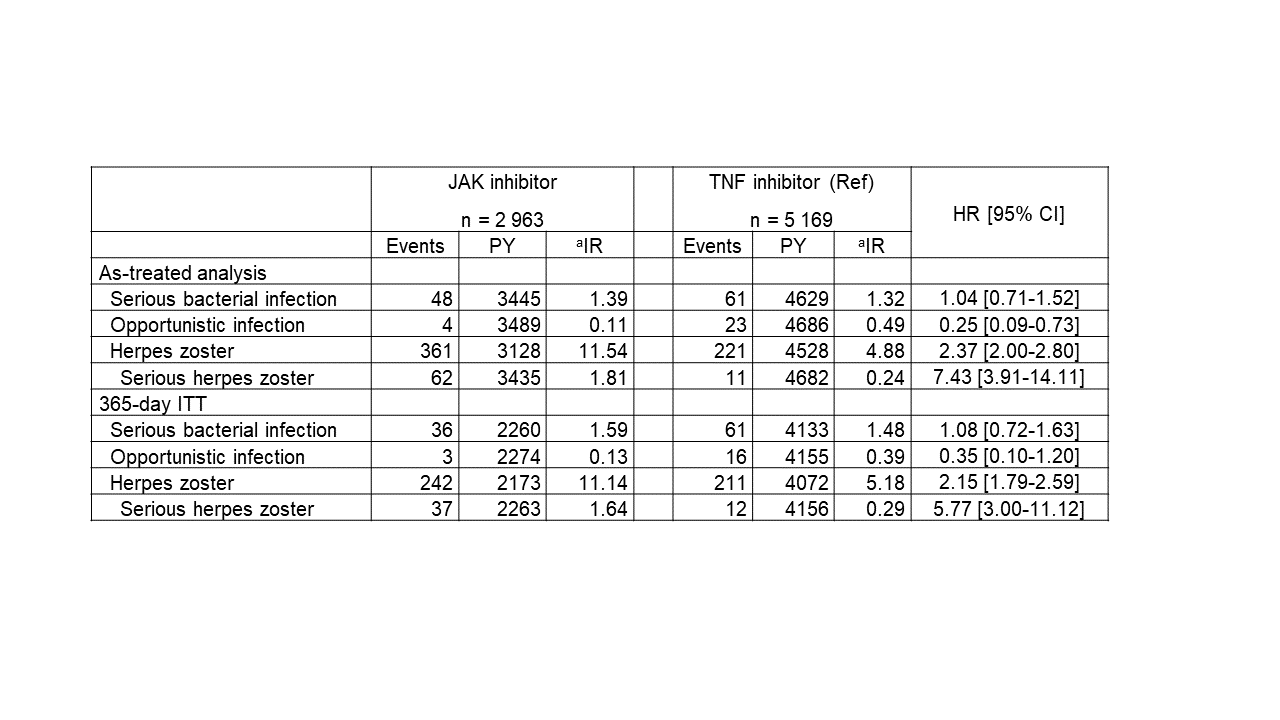Session Information
Date: Saturday, November 12, 2022
Title: RA – Treatment Poster I
Session Type: Poster Session A
Session Time: 1:00PM-3:00PM
Background/Purpose: To compare infectious risk between JAK inhibitors (JAKi) versus TNF inhibitors (TNFi) among patients with rheumatoid arthritis (RA) in Korea.
Methods: Using 2009-2019 Korea National Health Insurance Service database, we conducted a cohort study on RA patients initiating JAKi or TNFi. The outcomes of interest were 1) serious bacterial, 2) opportunistic, and 3) herpes zoster infections. Propensity-score fine-stratification (PSS) based weighting was applied to adjust for >60 baseline covariates. Hazard ratios (HRs) and 95% confidence intervals (CIs) were estimated using Cox proportional hazard models comparing JAKi versus TNFi users.
Results: Among 2,967 JAKi initiators and 13,152 TNFi initiators, 2,963 JAKi initiators PSS-weighted on 5,169 TNFi initiators were included. During a mean follow-up of 1.16 years, the most frequent type of infections was herpes zoster with an incidence rate (IR) per 100 person-years of 11.54 and 4.88 in JAKi and TNFi users, respectively, followed by serious bacterial infections with an IR of 1.39 and 1.32, respectively. The opportunistic infection was rare with a majority being tuberculosis, and showed an IR of 0.12 and 0.49 in JAKi and TNFi users, respectively. The PSS-weighted HR [95% CI] for individual types of infections was 2.37 [2.00-2.80] for herpes zoster, 1.04 [95% CI] for serious bacterial infections, and 0.25 [0.09-0.73] for opportunistic infections, comparing JAKi to TNFi initiators. The risk of hospitalized herpes zoster was even higher among JAKi than TNFi initiators with a HR of 7.43 [3.91-14.11].
Conclusion: In this nationally-representative cohort study on RA patients, we found an exceptionally high IR of herpes zoster among JAKi initiators in Korea, showing a doubled risk compared to that in TNFi initiators. Although the risk of serious bacterial infections was comparable between the two treatment groups, the risk of opportunistic infections, particularly tuberculosis, was less among JAKi than TNFi initiators.
To cite this abstract in AMA style:
CHOI S, Shin A, Ha Y, Lee Y, Lee E, Kang E. Risk of Infections Between JAK Inhibitors and TNF Inhibitors Among Patients with Rheumatoid Arthritis [abstract]. Arthritis Rheumatol. 2022; 74 (suppl 9). https://acrabstracts.org/abstract/risk-of-infections-between-jak-inhibitors-and-tnf-inhibitors-among-patients-with-rheumatoid-arthritis/. Accessed .« Back to ACR Convergence 2022
ACR Meeting Abstracts - https://acrabstracts.org/abstract/risk-of-infections-between-jak-inhibitors-and-tnf-inhibitors-among-patients-with-rheumatoid-arthritis/

